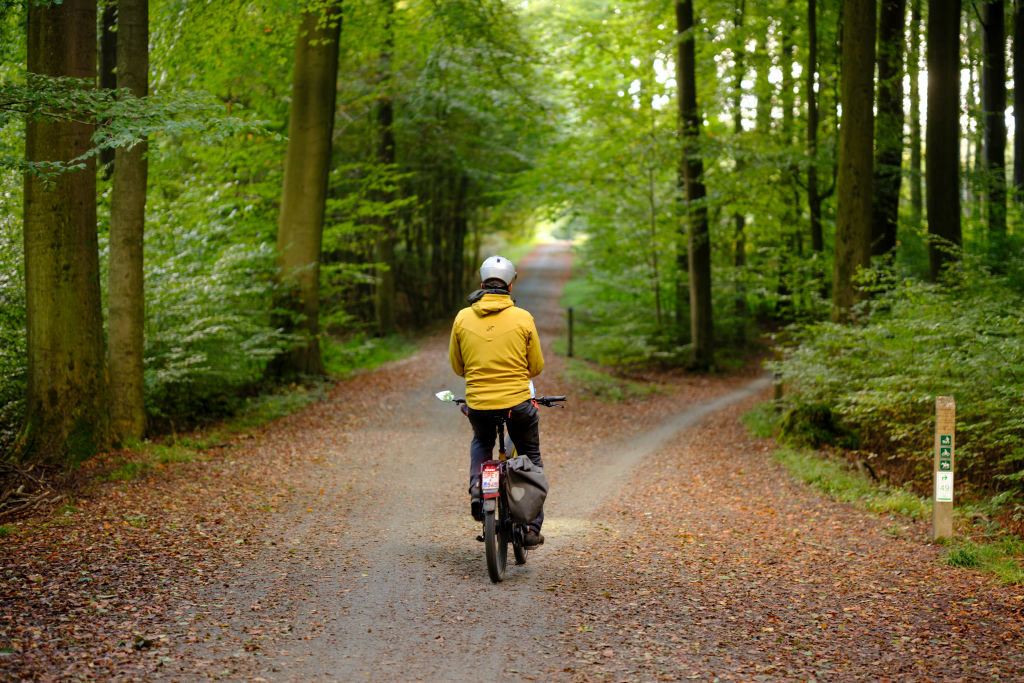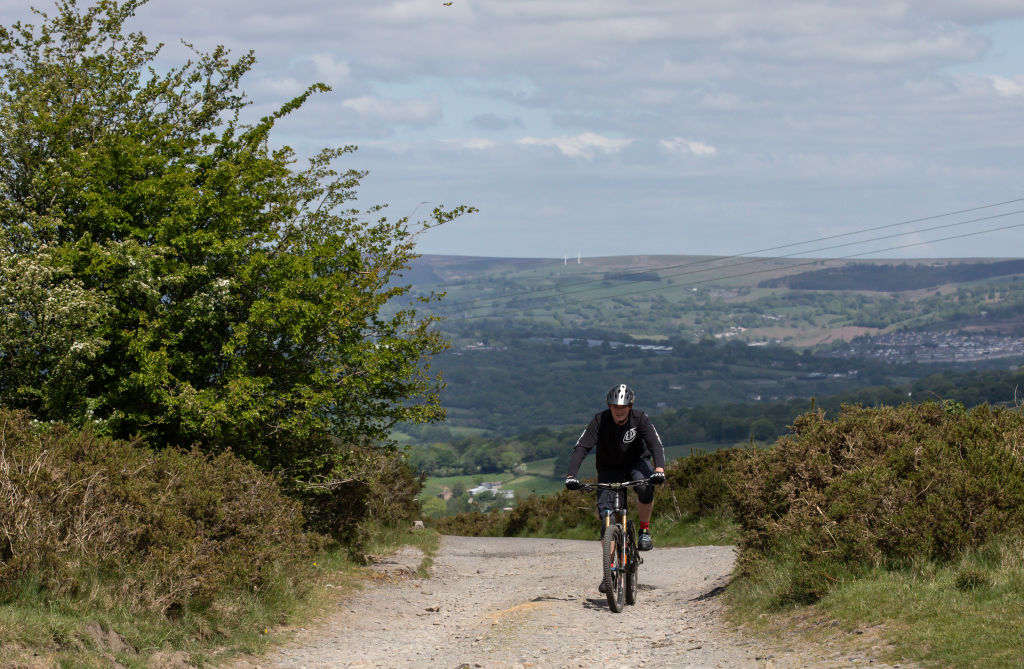
There are many reasons you might want to learn about the benefits of cycling. Maybe you’re curious about how your favourite pastime could impact your mental health and sleep patterns. Perhaps you’re trying to get fitter, or you’re prepping for an inevitable chat with someone who doesn’t understand why you do it.
Whatever the reason, we can confidently say that cycling comes with a boatload of benefits. From elite racing to making local journeys by bike, any time spent in the saddle can only be a good thing.
In this article, we’ll draw upon the expertise of researchers, health professionals and other prominent figures to take a deep dive into some of the key benefits of cycling, so you can ride out with the confidence that you’re doing something great for yourself, as well as the community around you.

Cycling makes you stronger and fitter
Let’s start with one of the more obvious benefits of cycling. It’s a form of aerobic exercise that can do wonders for your health, so cycling for fitness is a great way to give yourself a boost.
“The physical benefits of cycling are wide ranging,” says Gail Brown, a physiotherapist and cyclist. “It’s a great way to work your cardiovascular system, mobilise joints and strengthen your muscles without much impact.”
Contrary to popular belief, cycling doesn’t just work your legs. “When you ride a bike, you need to balance, engage your core, and work the muscles throughout your upper body,” explains Brown. “It’s a full-body activity, ideal for managing health conditions, maintaining fitness, and building strength, whatever system is affected.”
Cycling is also particularly useful for anyone who’s recovering from surgery or illness. According to Brown, choosing the right format and intensity to start with is key: “Sometimes, being open to using indoor trainers, adapted bikes, or e-bikes is important to create a load that’s manageable and feels good,” she explains. So if you were thinking of investing in one of the best smart trainers, or best electric bikes, there’s your sign to go for it.
Plus, the benefits extend beyond recovery. There are endless ways to get the most out of cycling and boost your health, whether it’s through endurance training, increasing power output, or simply enjoying the freedom of movement.
“Of course, as with any activity that makes you feel alive, it comes with some injury risk. However, not engaging with activity carries a much bigger risk of developing health conditions,” says Brown. “In fact, cycling has been shown to drastically reduce all cause mortality risk. People who cycle to work, compared to non-active commuters, were found to have a 47 percent lower risk of dying from any cause! How amazing is that?”

Cycling is good for the environment
With the climate crisis still very much in need of addressing, cycling offers a clean, green alternative to driving. This benefits not just the individual but the community as a whole, by reducing carbon emissions and air pollution. So if you’ve been on the fence about leaving the car at home more, then there are many reasons you should cycle to work.
Rachel Aldred, Professor of Transport at the University of Westminster, emphasises the importance of making the switch: “It’s important where cycling trips come from,” she says. “If people switch from car, taxi, or motorbike, this reduces emissions of carbon and local air pollutants like particulate matter and helps cut road noise.”
Given that road transport accounts for over 25 percent of carbon emissions, Aldred notes that these changes can make a significant difference: “These benefits can be substantial and also contribute to local environments being more pleasant.”
Peter Roderick, Director of Public Health at City of York Council, further highlights these benefits. He explains that York’s Local Transport Strategy is committed to reducing car traffic by 20 percent and making cycling one of the easiest and most affordable ways to get around. By encouraging a shift away from cars, he says, cities can drastically lower emissions and become healthier and more sustainable: “Increased cycling also contributes to better air quality and reduced road congestion, benefitting the population as a whole,” Roderick adds.
Bruce Bennett, Professor in Film Studies at Lancaster University and author of Cycling and Cinema, explores a more conceptual connection between cycling and the environment. Reflecting on the impact cycling has had over time, he suggests that it allows us to reconnect with our surroundings in a unique way: “We take the bicycle too much for granted, but it could have a far-reaching and revolutionary effect on the world in the next century.” In this sense, cycling doesn’t just reduce our carbon footprint; it also provides us with a more intimate connection to the world around us.
He adds: “Like the gaze of the film spectator, the mobile gaze of the cyclist reveals new visual and conceptual perspectives on the environments through which they travel, bringing significant details into dramatically sharp focus.” In other words, cycling gives us a closer, more personal experience with our surroundings, and allows us to access landscapes we wouldn’t otherwise reach behind the wheel of a car. Perhaps this kind of connection to our local environment will motivate us to protect and preserve it.

It can improve your mental health
In addition to physical fitness, the mental health benefits of cycling are vast, from reducing stress and anxiety, to improving mental focus and clarity and promoting better sleep. We’ve written before about how indoor workouts can benefit mental health, and being outside can be even better.
According to Josephine Perry, Chartered Sport and Exercise Psychologist and author of The Psychology of Exercise: “Cyclists know that their bike doesn’t just help them stay fit and healthy physically, but also mentally.” Crucially, she continues: “There is now a stack of scientific evidence which backs up this belief.” For some mental health issues, Perry notes, riding a bike “can sometimes be as effective as a pill or psychological therapies.”
The impact extends beyond just the body: “When we cycle regularly, we increase our physical and general self-esteem. Those with high self-esteem tend to have high life satisfaction, resilience, and greater achievement in education and work.” This can have far-reaching effects on life satisfaction and overall mental wellbeing, helping cyclists to effectively manage everyday challenges.
Even a short bike ride can have a profound impact on our mood. In one study, participants who exercised for 30 minutes before watching an emotional video bounced back from negative emotions faster than those who simply stretched. This, says Perry, shows how “exercise can help us bounce back quicker when negative things do happen to us.”
For an even greater mental health boost, she suggests venturing into nature: “Researchers have found that being in the natural environment can reduce stress and help us recover better from stressful events. The benefits are often amplified if we’re not only spending time in the rural outdoors but also exercising in it.”
So there is plenty of evidence to show that cycling in the fresh air does more than just make us feel good, physically. There’s even more to learn about how cycling can benefit physical and mental health for women specifically.

It can make you more productive
Not only can cycling improve your mental wellbeing in relation to stress, anxiety and depression, but it can help sharpen your mind and focus at work. “I have often come back from a ride finding I have a much clearer head, I feel more creative and I am better able to make a difficult decision,” says Perry.
There’s even research to back this up, suggesting that cycling may boost brain function: “Neuroscientists have found that when we do vigorous exercise our frontal executive network system (the part of our brain just behind our forehead) gets increased blood flow,” Perry explains. “This area is linked with planning, focus and concentration and goal-setting suggesting that exercising is giving us cognitive clarity.”
She continues, explaining that the hippocampus, which is the part of the brain responsible for learning and memory, also benefits from regular exercise like cycling. According to recent studies, she says, vigorous aerobic exercise can “trigger new neurons to develop”, which means regular cycling could even improve our cognitive performance over time.

It can bring people together
Beyond the positive effects on physical and mental health, there are plenty of social benefits of cycling as well, whether it’s through joining a cycling club or connecting with others at a community bike kitchen. Cycling (and by extension, tinkering with bikes) as a group can be a great way to meet like minded people.
Organisations like The Bristol Bike Project (BBP) and Cycling UK’s Community Cycle Clubs programme provide an array of sessions and workshops specifically aimed at socially isolated people and those who face barriers to employment. They do more than just put bikes back on the road; they create meaningful connections within the community.
Sarah Mitchell, chief executive at Cycling UK, explains: “Through projects like our Community Cycle Clubs programme, we’ve helped build and foster relationships with youth groups, refugees, people with disabilities, and those more impacted by the cost-of-living crisis. By creating welcoming communities for people who enjoy cycling, we not only encourage better physical and mental health through exercise, but we also create a place for people to meet and make friends. Our Community Cycle Clubs are truly inspiring, and we’ve seen how they can help rebuild confidence and foster bonds that last a lifetime.”
Drew Rose, HR & Governance Coordinator at BBP, adds: “Of course, it’s important to us that we’re reducing waste by repairing and rehoming unwanted bikes, but there are also less obvious benefits from our community bike workshop that are just as important. For example, bringing participants and volunteers together from very different backgrounds increases community cohesion and reduces social isolation.”
In this way community bike projects offer more than just access to cycling; they cultivate a sense of belonging, provide practical skills, and create a supportive network that extends beyond the workshop.
Peter Cox, Emeritus Professor at the Centre for Technology and Social Change, Linköping University, expands on this: “Cycling, and especially the shared act of working on bikes together, can create a profound sense of belonging and collective identity for those who may feel isolated. For individuals who are part of visible minorities or marginalised groups, these activities go beyond simple recreation. They provide a space to connect with others over shared practices, fostering clusters of cultural identities and mutual support.”
In this sense, cycling and the communities that form around it can offer a crucial support network, helping people to develop skills and connections that might otherwise be out of reach to them.
As you can see, there are plenty of great benefits of cycling. Not only does exercising in the fresh air improve your physical health, it can boost your mental health as well. On top of that, getting involved in cycling communities and local projects can provide opportunities to meet and connect with likeminded people, and it can’t be understated just how much better it is for the environment than driving.
So whether you were just curious to learn more, or were arming yourself with the facts to share with others, you should have plenty to go on now.
Are there any other benefits you’ve noticed that we’ve not talked about here? If so, share them in the comments.







